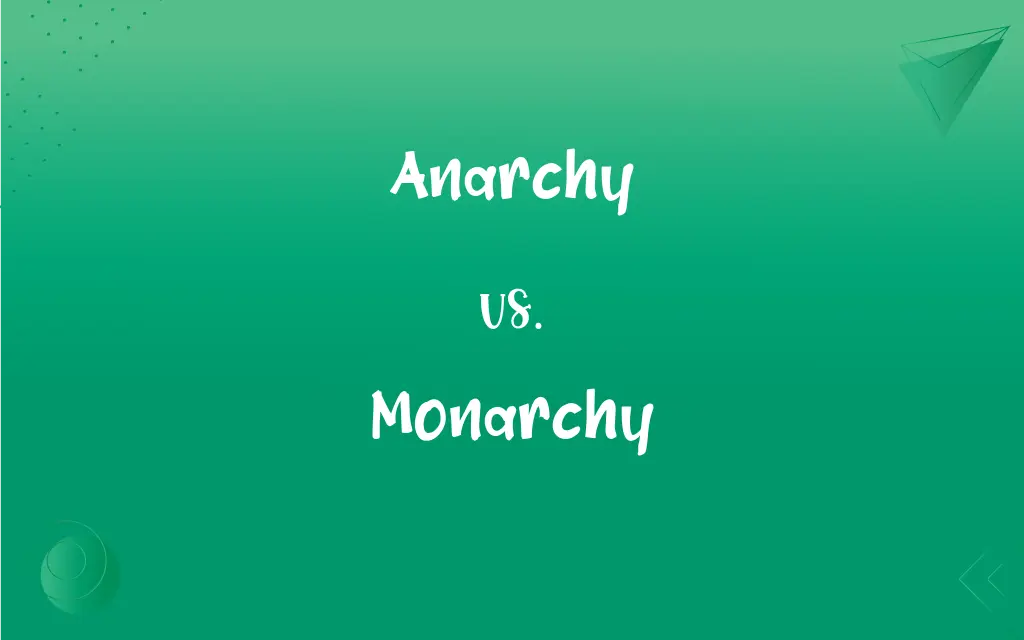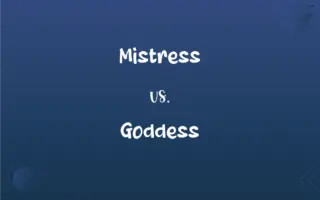Anarchy vs. Monarchy: What's the Difference?
Edited by Harlon Moss || By Janet White || Updated on October 4, 2023
Anarchy is the absence of government and organized authority, while Monarchy is a form of government with a single ruler, typically a king or queen.

Key Differences
Anarchy is a state of society where there is no established authority, law, or governmental structure. This could be due to the dissolution or non-existence of governance. Monarchy, on the other hand, is an established form of governance where a single individual, such as a king or queen, reigns, often with significant or absolute power.
The word Anarchy has its roots in the Greek term "anarkhia," meaning "without a ruler." It often implies chaos or disorder due to the lack of centralized rule. Monarchy derives from the Greek term "monarkhia," where "mono" means one, signifying rule by a single individual.
Anarchy is not always used in a negative context; some anarchists advocate for a society without rulers where people govern themselves through mutual cooperation. Monarchy, while centralized, can vary in power dynamics; some monarchies are absolute, while others are constitutional, with limited powers and a ceremonial role.
Anarchy, in literature and pop culture, is often represented as a chaotic time where there's a breakdown of societal norms. Monarchy is frequently depicted as a time of grandeur, tradition, and sometimes tyranny, depending on the ruler's disposition.
Anarchy and Monarchy represent two extremes on the spectrum of governance. Where Anarchy denotes the complete absence of formal rule, Monarchy is a testament to centralized authority in the hands of one.
ADVERTISEMENT
Comparison Chart
Primary Definition
Absence of government and authority.
Rule by a single individual, often hereditary.
Etymological Root
Greek "anarkhia" - without a ruler.
Greek "monarkhia" - single ruler.
Connotation
Often implies disorder or chaos.
Suggests centralized power, can be ceremonial or absolute.
Representation
Breakdown of societal norms.
Grandeur, tradition, and sometimes tyranny.
Position on Governance Spectrum
Represents a lack of governance.
Centralized authority, one end of the governance spectrum.
ADVERTISEMENT
Anarchy and Monarchy Definitions
Anarchy
A state of lawlessness.
With no police presence, it was complete anarchy on the streets.
Monarchy
Dominance or rule by one.
The company operated like a monarchy with the CEO having absolute power.
Anarchy
A political ideal advocating a society based on voluntary cooperation.
Some believe anarchy can lead to a harmonious community.
Monarchy
A system based on hereditary rulership.
The monarchy passed its rule from one generation to the next.
Anarchy
Absence of any form of political authority.
Monarchy
A form of government with a monarch at the head.
The United Kingdom is a constitutional monarchy.
Anarchy
Political disorder and confusion.
Monarchy
The monarchy as an institution or the reigning monarch.
The monarchy has ceremonial roles in many countries.
Anarchy
Absence of any cohesive principle, such as a common standard or purpose.
Monarchy
Government by a monarch.
Anarchy
(uncountable) The state of a society being without authorities or an authoritative governing body.
Monarchy
A state ruled or headed by a monarch.
Anarchy
(uncountable) Anarchism; the political theory that a community is best organized by the voluntary cooperation of individuals, rather than by a government, which is regarded as being coercive by nature.
Monarchy
A government in which sovereignty is embodied within a single, today usually hereditary head of state (whether as a figurehead or as a powerful ruler).
An absolute monarchy is a monarchy where the monarch is legally the ultimate authority in all temporal matters.
A constitutional monarchy is a monarchy in which the monarch's power is legally constrained, ranging from where minor concessions have been made to appease certain factions to where the monarch is a figurehead with all real power in the hands of a legislative body.
Anarchy
(countable) A chaotic and confusing absence of any form of political authority or government.
Monarchy
The territory ruled over by a monarch; a kingdom.
Anarchy
Confusion in general; disorder.
Monarchy
A form of government where sovereignty is embodied by a single ruler in a state and his high aristocracy representing their separate divided lands within the state and their low aristocracy representing their separate divided fiefs.
Anarchy
Absence of government; the state of society where there is no law or supreme power; a state of lawlessness; political confusion.
Spread anarchy and terror all around.
Monarchy
States based on a system of governance headed by a king or a queen.
Anarchy
Hence, confusion or disorder, in general.
There being then . . . an anarchy, as I may term it, in authors and their re koning of years.
Monarchy
A state or government in which the supreme power is lodged in the hands of a monarch.
Anarchy
A state of lawlessness and disorder (usually resulting from a failure of government)
Monarchy
A system of government in which the chief ruler is a monarch.
In those days he had affected zeal for monarchy.
Anarchy
Absence of government and absolute freedom of the individual.
The sudden dissolution of the government led to anarchy in the region.
Monarchy
The territory ruled over by a monarch; a kingdom.
What scourage for perjuryCan this dark monarchy afford false Clarence.
Anarchy
A state of disorder due to absence or non-recognition of authority.
After the riots, the city descended into anarchy.
Monarchy
An autocracy governed by a monarch who usually inherits the authority
Monarchy
A state or nation in which the supreme power is held by a single ruler.
The monarchy of Saudi Arabia has been established for many years.
FAQs
Can anarchy be a political belief?
Yes, some anarchists advocate for voluntary cooperation without rulers.
Does anarchy always mean chaos?
Not necessarily; it denotes lack of formal governance, but some see it as a self-governing ideal.
How do monarchs get their power in a constitutional monarchy?
They typically have ceremonial roles, with real political power lying elsewhere, e.g., a parliament.
Is a monarchy always hereditary?
Often, but not always. Some monarchies appoint rulers based on criteria other than lineage.
Is anarchy the opposite of monarchy?
In terms of governance structure, they are on opposing ends of a spectrum.
Are anarchistic societies sustainable?
This is debated. Some believe in sustainable self-governing anarchy, while others see it as inherently unstable.
Do monarchies exist in modern times?
Yes, both in absolute and constitutional forms in various countries.
How long has the concept of monarchy existed?
Monarchies have existed for millennia across various cultures.
Does anarchy reject all forms of authority?
Anarchy rejects centralized or imposed authority, but some forms advocate self-governance.
Do all countries with kings or queens function as monarchies?
No, some have ceremonial monarchs with real power lying in democratic institutions.
How do monarchs in constitutional monarchies differ from presidents?
Monarchs often have hereditary or ceremonial roles, while presidents are elected and have administrative duties.
Is monarchy restricted to European history?
No, monarchies have existed worldwide in various cultures and times.
Is anarchy inherently violent?
Not inherently, though some periods of anarchy have witnessed violence.
Can anarchy be temporary?
Yes, anarchy can be a transitional phase between different governance structures.
What's a key difference between anarchy and democracy?
Democracy has formal governance structures based on citizens' input; anarchy lacks such structures.
Are monarchs the sole decision-makers in their countries?
In absolute monarchies, yes, but in constitutional ones, they often have limited or symbolic roles.
Are all monarchies absolute in power?
No, there are constitutional monarchies with limited or ceremonial powers.
Can anarchy exist within small groups?
Yes, small communities or groups might operate anarchically by mutual agreement.
Can there be a blend of anarchy and other governance forms?
Anarchy, by definition, lacks formal governance, but elements of anarchistic ideals can coexist with other systems.
Is anarchy a form of rebellion?
It can be, especially when rising against perceived oppressive rule.
About Author
Written by
Janet WhiteJanet White has been an esteemed writer and blogger for Difference Wiki. Holding a Master's degree in Science and Medical Journalism from the prestigious Boston University, she has consistently demonstrated her expertise and passion for her field. When she's not immersed in her work, Janet relishes her time exercising, delving into a good book, and cherishing moments with friends and family.
Edited by
Harlon MossHarlon is a seasoned quality moderator and accomplished content writer for Difference Wiki. An alumnus of the prestigious University of California, he earned his degree in Computer Science. Leveraging his academic background, Harlon brings a meticulous and informed perspective to his work, ensuring content accuracy and excellence.































































